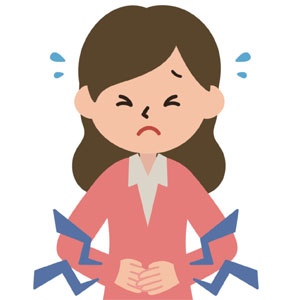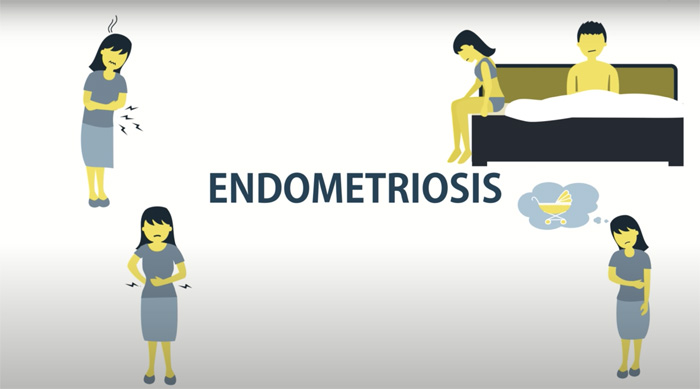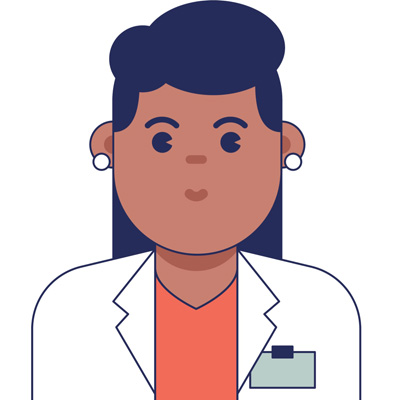What is Endometriosis?
Endometriosis occurs when tissue similar to the lining of the uterus, the endometrium, is found outside of the uterus, where the tissue does not belong. The tissue responds to the monthly fluctuations of a woman's menstrual cycle, resulting in inflammation. Generally, endometriosis is found in the pelvic cavity. It can attach to any of the female reproductive organs and can also involve the bowel, intestines, and appendix. Symptoms can be felt as early as the first period and can continue through menopause.
As such, symptoms of endometriosis may include:
- Debilitating cramps that disrupt your daily activities
- Long and heavy periods (for some people, this may mean lasting longer than 7 days and soaking a pad or tampon an hour)
- Nausea and/or vomiting
- Constipation, diarrhea, and/or painful bowel movements
- Painful sex
- Infertility
Most importantly: Are these symptoms worse before or during your period?
 There are many symptoms of endometriosis and the disease presents itself differently in all women. Patients may suffer from all of the symptoms above or just one. Endometriosis is often misdiagnosed as IBS or appendicitis, among other conditions. If you think endometriosis may be the source of your pain and discomfort, it is important to see a doctor.
There are many symptoms of endometriosis and the disease presents itself differently in all women. Patients may suffer from all of the symptoms above or just one. Endometriosis is often misdiagnosed as IBS or appendicitis, among other conditions. If you think endometriosis may be the source of your pain and discomfort, it is important to see a doctor.
What Should I Do If I Think I Have Endometriosis?
1. Find A Doctor or Clinic
 To ensure proper treatment, make an appointment with a gynecologist if at all possible. You may begin to discuss your symptoms with your family doctor, community clinic, or other trusted medical professional who can assist you with recommendations and referrals to a gynecologist or endometriosis specialist. Never be afraid to get a second opinion as endometriosis is often misdiagnosed by even the most credentialed doctors.
To ensure proper treatment, make an appointment with a gynecologist if at all possible. You may begin to discuss your symptoms with your family doctor, community clinic, or other trusted medical professional who can assist you with recommendations and referrals to a gynecologist or endometriosis specialist. Never be afraid to get a second opinion as endometriosis is often misdiagnosed by even the most credentialed doctors.
2. Prepare For Your Appointment
Track your symptoms
How will you best describe when and where you are feeling pain? Use a calendar or app to track your symptoms as much and as often as possible. Do not forget to bring your symptom tracker and full medical history to your appointment! Check out these period and symptom tracking apps.
Prepare a list of questions for your doctor, such as:
- What are the best ways to manage my symptoms?
- What treatment options are available? What are the side effects? How many of your patients have endometriosis? (if possible, you may want to seek a doctor who has experience treating patients with endometriosis)
- Don’t be afraid to ask questions!
Be prepared to answer questions the doctor may ask you, such as:
- How long have you been feeling your symptoms?
- Do the symptoms happen all the time, or only during and/or close to your period?
- What is your family medical history? Do you have any female relatives who have had the same symptoms?
Please note: if the doctor does not ask these questions, don’t hesitate to bring them up yourself.
3. Treat and Manage Your Symptoms
 While there is no cure for endometriosis, there are treatment and management options available. The earlier endometriosis is diagnosed, the better, as the disease can progress over time and symptoms can become more severe. Please remember there is a difference between managing and treating endometriosis. Symptom management may include use of hormonal therapies (such as birth control), physical therapy, and a change in diet. Treatment options may include laparoscopic excision surgery, which you and your doctor may consider if management options are not successful.
While there is no cure for endometriosis, there are treatment and management options available. The earlier endometriosis is diagnosed, the better, as the disease can progress over time and symptoms can become more severe. Please remember there is a difference between managing and treating endometriosis. Symptom management may include use of hormonal therapies (such as birth control), physical therapy, and a change in diet. Treatment options may include laparoscopic excision surgery, which you and your doctor may consider if management options are not successful.
Not everyone is the same; every patient will benefit differently from each treatment. What may work for one woman may not for another. Therefore, it is important that you work with your doctor to determine which treatment and management options are best for you.
 For more information on endometriosis, diagnosis, treatment, and management, explore endofound.org.
For more information on endometriosis, diagnosis, treatment, and management, explore endofound.org.
The Endometriosis Foundation of America’s (EndoFound) mission is to increase disease recognition, provide advocacy and education, and fund landmark endometriosis research.



